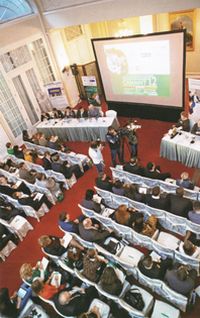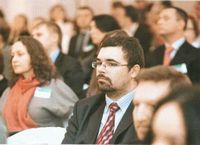Developers Celebrate Christmas
.png)
The Christmas summit for representatives of the commercial real estate market was traditionally held on New Year’s Eve in St. Petersburg. The participants reviewed the year’s results for the commercial real estate market and discussed the most relevant problems they faced during the outgoing year.
Passions for General plan

The meeting began with the analysis of the city administration’s work and legal amendments. The unsolved problem of surmounting numerous bureaucratic snags incited a heated debate, as always. In particular, the participants of the summit pointed out: in order to get a construction permit today, it is necessary to pass 51 procedures that take about 423 days. Notwithstanding the governmental “road map” that provides for only 11 procedures and the settlement of all project coordination issues during the record 56 days, representatives of the business community doubt that things will change for the better. For instance, they are skeptical about the introduction of a simple notification procedure, whereby the developer must send six letters to the authorities, notifying of the start of construction, whereas officials must reply within 30 days. In the opinion of Igor Vodopianov, managing partner of MC Teorema, delays are not excluded even in this situation: any project may trigger questions from public officials, they may require clarification and as a result the procedure may drag on several months.
Alexander Vakhmistrov, CEO and Board Chairman of LSR Group, present at the discussion, agreed that the decision-making process of St. Petersburg officials is too slow. Above all, this regards amendments to St. Petersburg’s General plan, rather than administrative barriers. In his opinion, mistakes in the main town-planning documents to a greater extent slow down the work of the construction complex. Mr Vakhmistrov reminded that by now more than 1500 amendments to the General plan have been submitted. But most of them may not be accepted, since quite often they are dictated by the personal, selfish interests of some developers. “I believe excessively detailed elaboration is the fundamental mistake in shaping the General plan,” stated the head of LSR Group. “Everything is unnecessarily pigeonholed and the General plan seems to reiterate the Land Development Rules.”
Alexander Olkhovsky, vice president and managing director of Bank VTB, also thinks there’s no need to make the Master plan excessively elaborate. He believes the main conceptual problem of this document is the desire to increase the number of square meters per St. Petersburger, whereas the General plan must enable polycentric development and creating of more human-friendly urban territories, in the first place. In the opinion of Mr Olkhovsky, in the lack of intelligible priorities and goals which can be the only legitimate driver of amendments entered into the General plan, any corrections make no sense. “When new priorities do not appear, it is necessary just to eliminate the technical errors in the Master plan that reflect the philosophy of the early 2000s,” noted Olkhovsky.
Responding to the statement of Alexander Olkhovsky, advisor of St. Petersburg governor Vyacheslav Semenenko noted that the issue about the volumes of housing under construction is still relevant and its importance should not be belittled. “The city needs a lot of housing, Mr Semenenko is convinced. “If we want to bring per capita residential housing up at least to the level of Eastern Europe, there should already be 1.5 times more living space in the city. Without new construction we’ll never settle the issue of resettling the dwellers of shared apartments or the problem of housing distributed among the privileged categories. Moreover, once the volumes of new construction are reduced, prices surges are inevitable and this is inadmissible because the prices are already exorbitant.”
Everything has to be built
At the same time, Mr Semenenko agreed with Alexander Olkhovsky that new comfortable residential areas need to be created. He noted that modern-day St. Petersburgers do not want to get just shell-and-core living space in new builds, but also diverse urban environment – shops, clubs, restaurants, children’s institutions, recreational and leisure facilities and clinics. “We experience a certain logical deadlock in urban development, since the basic infrastructure lags behind the pace of construction works. I think developers should review their approaches to project delivery: not only should they build, but also act as management companies developing the territory,” the governor’s advisor is convinced.
He said that St. Petersburg authorities were going to bind investors to build at their own expense not only daycare centers and road networks, but also clinics, stations for accommodating law-enforcement structures, recreational and sports facilities. In his opinion, developers can make the erection of this infrastructure an effective business. “The commercial function should be combined with the social one. For example, sports complexes can be used for school classes in the morning, in which case the costs will be covered by the federal budget, and function as commercial enterprises in the evening. The same pertains to objects of culture. Private kindergartens might also be turned into successful businesses, when properly managed.”

However developers were not overjoyed at the prospect to build social infrastructure. It’s much more interesting to engage in the realization of retail projects which, along with residential developments, are most investment attractive options not only in St. Petersburg, but in many big regional cities of Russia, as well, according to Vladislav Fadeev, head of the marketing team at the consulting department of GVA Sawyer. For this reason it is in these segments that the greatest increase in sale and lease rates can be expected in the year to come.
The growth of prices will be insignificant in the segment of hospitality real estate, in the words of Mikhail Kolesnik, development director of Marriott International Inc for Russia and the CIS, because the hotel business keeps growing and some of the hotel market segments are close to saturation in St. Petersburg. “It is getting ever less paying to build large hotels, especially in the luxury sector, and in some cases this is unprofitable. The market is no longer interested in standard projects. Signature and boutique hotels are in higher demand now,” noted Mr Kolesnik.
Creativity is hailed in the office real estate as well. In the opinion of Andrei Rozov, spearheading a representative office of Jones Lang LaSalle in St. Petersburg, if all principal quality standards and such basic parameters as location, ample parking space etc. are available, in some cases the office building’s creative solutions are a bonus that improves liquidity and appreciates the property value. He also noted that in 2012 net absorption exceeded the commissioning parameters; in this connection the base rent somewhat increased during the year: by 4–6 % in class B and by 7–9 % in class A. In the warehouse market construction volumes are miserable, especially in class A, and so the rental rate in this segment was inevitably rising during the year, in the words of Nikolai Pashkov, CEO of Knight Frank St. Petersburg.
The summit ended in a charity auction and a lottery to support the kids – the wards of the charity fund AdVita. Their paintings as well as toys for the New Year Tree, signed by governor Georgiy Poltavchenko, vice governor Igor Metelsky, Bank VTB’s Alekxander Olkhovsky, CEO of Russian Auction House Andrei Stepanenko, CEO of Pioneer Group SPb Yuri Grudin, football goalkeeper Vyacheslav Malafeev and designer Elena Badmaeva, were put up for sale as auction lots. One of the lots was a jacket of the head coach of FC Zenit Lucciano Spaletti with his signature. The starting price of all the lots was 10,000 rubles, with the bid increment standing at 2000 rubles. The sum of donations thus raised reached 482,000 rubles.
Автор: Tatiana Elekoeva
CRE #1-2(58), January 2013

